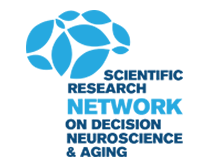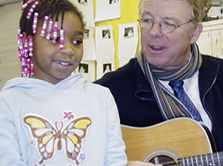The mission of the Mind Division is to harness the human capital represented in a growing number of mature and talented older citizens. Absent significant disease, aging is associated with an increase in knowledge and expertise, emotional stability and heightened motivation to engage in meaningful work. At the same time, the speed and efficiency of new learning typically declines with age, as does sensory functioning affecting hearing and vision. Such changes can hamper the effectiveness with which people engage with work, families and communities.
2013-14 PROJECTS
RESEARCH NETWORK ON DECISION NEUROSCIENCE AND AGING
 The Center continues its work with a National Institutes of Health (NIH) funded Network Grant on Decision Neuroscience and Aging. The scientific leadership team includes David Laibson (Harvard, Economics), Laura Carstensen, and Camelia Kuhnen (Northwestern, Finance.) There are two $20,000 seed grants currently underway in this area of decision neuroscience and aging. Dr. Natalie Ebner of the University of Florida is studying the role of oxytocin and social decision making in aging and Dr. Anthony Porcelli of Marquette University is studying acute stress and age-related differences in reward processing and executive function. In May 2014 the research network hosted a workshop on “translational” research on decision making across the life span. The workshop focused on translation across species (from rodents to non-human and human primates) and translation between the laboratory and the outside world. The event will feature short, informal talks about recent findings, current projects, and long-term goals and will convene small group discussions and brainstorming sessions for new research. Read more >
The Center continues its work with a National Institutes of Health (NIH) funded Network Grant on Decision Neuroscience and Aging. The scientific leadership team includes David Laibson (Harvard, Economics), Laura Carstensen, and Camelia Kuhnen (Northwestern, Finance.) There are two $20,000 seed grants currently underway in this area of decision neuroscience and aging. Dr. Natalie Ebner of the University of Florida is studying the role of oxytocin and social decision making in aging and Dr. Anthony Porcelli of Marquette University is studying acute stress and age-related differences in reward processing and executive function. In May 2014 the research network hosted a workshop on “translational” research on decision making across the life span. The workshop focused on translation across species (from rodents to non-human and human primates) and translation between the laboratory and the outside world. The event will feature short, informal talks about recent findings, current projects, and long-term goals and will convene small group discussions and brainstorming sessions for new research. Read more >
STUDY OF COGNITIVE BENEFITS OF VOLUNTEERING – Santa Clara County Project
 Mounting evidence suggests that volunteering confers psychological and physical benefits to older volunteers, along with obvious gains for communities. The Center has established a partnership with the leadership of Santa Clara County, California to enable research with a large and diverse workforce in order to better understand volunteering preferences. In collaboration with Jack Rowe and with initial funding from the MacArthur Foundation Research Network on an Aging Society and the National Institute on Aging, in November 2013 we completed a survey of current and retired Santa Clara County employees to identify barriers and incentives for volunteer engagement as well as current volunteer participation behavior.
Mounting evidence suggests that volunteering confers psychological and physical benefits to older volunteers, along with obvious gains for communities. The Center has established a partnership with the leadership of Santa Clara County, California to enable research with a large and diverse workforce in order to better understand volunteering preferences. In collaboration with Jack Rowe and with initial funding from the MacArthur Foundation Research Network on an Aging Society and the National Institute on Aging, in November 2013 we completed a survey of current and retired Santa Clara County employees to identify barriers and incentives for volunteer engagement as well as current volunteer participation behavior.
Over 4,000 employees and retirees participated in the survey. Survey respondents represented the entire adult life span, from 20 to 96 years of age, as well as a high degree of ethnic and socioeconomic diversity. Data analysis is currently ongoing, and preliminary findings were presented in a meeting of the MacArthur Research Network on an Aging Society (September 2013) as well as in a symposium at the annual meetings of the Gerontological Society of America (November 2013).
Findings from the survey indicate significant age differences in motivations to volunteer. Older workers and retirees were relatively more motivated by the prospect of improved well-being and emotional meaning, whereas younger workers were relatively more motivated by the potential that volunteering may improve their future prospect. We are currently working with the leadership of Santa Clara County to design a scalable intervention to increase volunteering engagement in the county. We plan to test different recruitment approaches through the intervention, with particular attention to the efficacy of targeting age-related motivations identified in our survey.
THE COGNITION AND RETIREMENT STUDY: “IS WORKING LONGER GOOD FOR YOU?” – Understanding potential pathways between working and cognitive performance
 With unprecedented increases in longevity, as a society, we are only recently starting to grapple with how older adults will want or need to spend these extra years and how this will influence their quality of life. Recent research shows that compared to those who are retired, adults of the same age who work have higher levels of cognitive functioning. However, existing studies have not examined the pathways by which retirement influences cognitive changes or the specificity of such effects across subgroups in the population. To the extent that participation in work roles contributes to cognitive health and vitality as we age, a full account of such effects will ultimately depend on a more holistic understanding of why and how retirement is related to cognitive changes in later life.
With unprecedented increases in longevity, as a society, we are only recently starting to grapple with how older adults will want or need to spend these extra years and how this will influence their quality of life. Recent research shows that compared to those who are retired, adults of the same age who work have higher levels of cognitive functioning. However, existing studies have not examined the pathways by which retirement influences cognitive changes or the specificity of such effects across subgroups in the population. To the extent that participation in work roles contributes to cognitive health and vitality as we age, a full account of such effects will ultimately depend on a more holistic understanding of why and how retirement is related to cognitive changes in later life.
With funding from the Alfred P. Sloan Foundation, this research study is designed to identify potential mediators to age-related cognitive decline. Based on longitudinal analysis of the Health and Retirement Study data and several HRS modules, this study is testing three broad hypotheses associated with the relationship between working and cognitive performance in later life:
(1) Personal characteristics (viz., selection) mediate the relationship between cognitive performance and working versus retiring in later life.
(2) Engagement behaviors mediate the relationship between cognitive performance and working versus retiring in later life.
(3) Occupational characteristics and activities mediate the relationship between cognitive performance and working versus retiring in later life.
This project will produce new knowledge about the factors that modify cognitive performance changes during the transition into retirement, and will serve as a pilot data for an experimental study. Dawn Carr (Stanford Center on Longevity) and Robert Willis (University of Michigan) are the investigators on this project.
“PASS IT ON: MOBILIZING ENCORE TALENT TO TRANSFORM THE PROSPECTS OF VULNERABLE CHILDREN AND YOUTH” – a Launch Conference held at Stanford on June 24 and 25, 2014
 The conference, “Pass it On: Mobilizing Encore Talent to Transform the Prospects of Vulnerable Children and Youth,” was sponsored by the Stanford Center on Longevity, the David & Lucile Packard Foundation, and Encore.org and was held at the Bechtel Conference Center at Stanford University on June 24 and 25, 2014.
The conference, “Pass it On: Mobilizing Encore Talent to Transform the Prospects of Vulnerable Children and Youth,” was sponsored by the Stanford Center on Longevity, the David & Lucile Packard Foundation, and Encore.org and was held at the Bechtel Conference Center at Stanford University on June 24 and 25, 2014.
The “launch conference” model, as developed by the Stanford Center on Longevity, is different from a traditional academic meeting: instead of focusing on what experts have learned and know as a means of sharing scholarship, a launch conference is a means of identifying new opportunities for advances in scholarship, policy, and practice, by focusing on what experts don’t know and should learn, and how. Launch conferences consist of directed discussions based on clear and results-oriented agendas. The goal is to address key questions that lead to consensus-building and concrete next steps.
The goal of the Pass It On conference was to explore what must be accomplished to establish new norms in American culture, so more people in the second half of life will choose, and be able, to invest in future generations and increase cooperation among generations. In particular, the conference sought to identify institutional and policy innovations that could enable more older Americans to employ their time, talent, and experience to help improve the education and development of America’s most vulnerable children and youth.
The focus was education- and learning-related services, from pre-K through college readiness and access programs. The discussion sought to better understand the state of the field—including the current cultural norms that influence many older Americans’ awareness of and inclination to engage in generative activities; the needs of vulnerable children and youth; the organizations that are helping meet those needs; needs that are not being met; and how human capital can help meet all of those needs. Read more